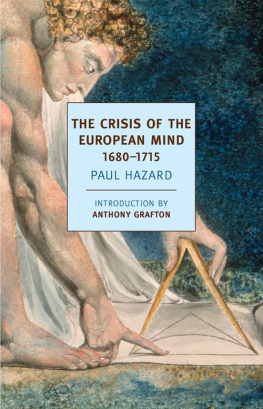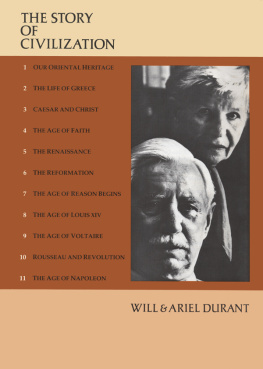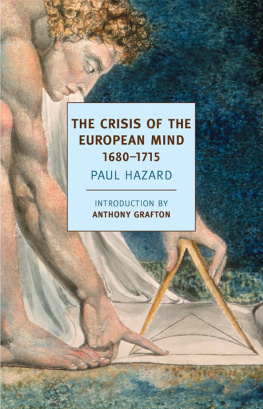Grafton Anthony Thomas - The crisis of the European mind, 1680-1715
Here you can read online Grafton Anthony Thomas - The crisis of the European mind, 1680-1715 full text of the book (entire story) in english for free. Download pdf and epub, get meaning, cover and reviews about this ebook. City: New York;Europa, year: 2013, publisher: New York Review Books, genre: Detective and thriller. Description of the work, (preface) as well as reviews are available. Best literature library LitArk.com created for fans of good reading and offers a wide selection of genres:
Romance novel
Science fiction
Adventure
Detective
Science
History
Home and family
Prose
Art
Politics
Computer
Non-fiction
Religion
Business
Children
Humor
Choose a favorite category and find really read worthwhile books. Enjoy immersion in the world of imagination, feel the emotions of the characters or learn something new for yourself, make an fascinating discovery.
- Book:The crisis of the European mind, 1680-1715
- Author:
- Publisher:New York Review Books
- Genre:
- Year:2013
- City:New York;Europa
- Rating:3 / 5
- Favourites:Add to favourites
- Your mark:
- 60
- 1
- 2
- 3
- 4
- 5
The crisis of the European mind, 1680-1715: summary, description and annotation
We offer to read an annotation, description, summary or preface (depends on what the author of the book "The crisis of the European mind, 1680-1715" wrote himself). If you haven't found the necessary information about the book — write in the comments, we will try to find it.
The crisis of the European mind, 1680-1715 — read online for free the complete book (whole text) full work
Below is the text of the book, divided by pages. System saving the place of the last page read, allows you to conveniently read the book "The crisis of the European mind, 1680-1715" online for free, without having to search again every time where you left off. Put a bookmark, and you can go to the page where you finished reading at any time.
Font size:
Interval:
Bookmark:

PAUL HAZARD (18781944) was an eminent French historian of ideas and a pioneering scholar of comparative literature. After teaching at the University of Lyon and the Sorbonne, he was appointed to the chair of comparative literature at the Collge de France in 1925 and in 1940 was elected to the French Academy. From 1932 on Hazard also taught at regular intervals at Columbia University, and he was in New York when the Nazis occupied France in 1940. He then returned to France to assume the rectorship of the University of Paris but was rejected for the position by the Nazis. Hazards reputation rests on two major works of intellectual history: The Crisis of the European Mind, from 1935, and its sequel, European Thought in the Eighteenth Century: From Montesquieu to Lessing, published posthumously in 1946.
JAMES LEWIS MAY (b. 1873) was a British critic and translator, best known as a translator and biographer of Anatole France. His 1928 translation of Madame Bovary for The Bodley Head was for many years the standard edition. In addition to translating The Crisis of the European Mind, May translated its sequel, European Thought in the Eighteenth Century.
ANTHONY GRAFTON is Henry Putnam University Professor of History and the Humanities at Princeton University. His most recent book is The Culture of Correction in Renaissance Europe.
THE CRISIS OF THE EUROPEAN MIND
16801715
PAUL HAZARD
Translated from the French by
J. LEWIS MAY
Introduction by
ANTHONY GRAFTON
NEW YORK REVIEW BOOKS

New York
THIS IS A NEW YORK REVIEW BOOK
PUBLISHED BY THE NEW YORK REVIEW OF BOOKS
435 Hudson Street, New York, NY 10014
www.nyrb.com
Copyright 1961 by Librairie Arthme Fayard
Introduction copyright 2013 by Anthony Grafton
All rights reserved.
First published in France as La Crise de la conscience europenne in 1935
This translation first published in England by Hollis & Carter in 1953
Cover image: William Blake, Newton, c. 1805; Tate London/Art Resource, NY
Cover design: Katy Homans
The Library of Congress has cataloged the earlier printing as follows:
Hazard, Paul, 18781944.
[Crise de la conscience europenne. English]
The crisis of the European mind / by Paul Hazard; introduction by Anthony
Grafton; translated from the French by J. Lewis May.
p. cm. (New York Review books classics)
Original English translation published as: The European mind. New Haven:
Yale University Press, c1953.
Includes index.
ISBN 978-1-59017-619-1 (alk. paper)
1. EuropeIntellectual life. 2. Philosophy, ModernHistory. 3. Literature,
Modern18th centuryHistory and criticism. I. Title.
D273.5.H313 2012
940.2525dc23
2012036638
eISBN 978-1-59017-639-9
v1.0
I N THE 1920s and 1930s, French scholars created new ways to do social, cultural, and economic history. First at Strasbourg and then at Paris, Marc Bloch and Lucien Febvre showed students how to free themselves from the tyranny of the Sorbonnistes and re-create a past that did not have high politics as its core. They pieced varied forms of evidencearchaeological and literary, legal and religioustogether into unforgettably colorful mosaics. Their re-creations of the practices of medieval farmers and craftsmen, the rituals of French kingship, and the religious lives of sixteenth-century intellectuals became models that were imitated for generations. Their journal, the Annales, provided a new space for intellectual explorers and a bully pulpit from which to denounce reactionaries. And their disciplesabove all Fernand Braudel, who spent the 1930s exploring the archives of the sixteenth-century Mediterranean worldbecame the most influential historians in the world in the 1950s and 1960s.
The accomplishments of the Annales school have cast the other kinds of history practiced in France in the same years into the shade. And thats a pity. For French historians of literatureincluding a number who held chairs at the Sorbonne and the other bastions of high academic culturealso crafted new kinds of history. Gustave Lansona prominent Sorbonnisteargued that the historical study of literature needed to rest on a sociological framework. The historian must tease out both the ways in which social and cultural environments shaped texts and the ways in which texts in turn transformed the social and political world. Lanson became something of a figure of fun, but he helped to inspire some great enterprises. In 1933, for example, another Sorbonne professor, Daniel Mornet, offered a rich account of The Intellectual Origins of the French Revolution. The philosophes, he arguedVoltaire and Diderot, dAlembert and Montesquieudeveloped a new critical spirit. And in the last decades of the eighteenth century, social and political changes transmuted these ideas into the program of modern Europes first great revolution. Ideas, Mornet held, destroyed the ancien rgime. Historians of the French Revolution still contend with his theory.
No one did more to develop the methods of Lanson and other French critics than Paul Hazard. Almost eighty years after it first appeared, his Crisis of the European Mind remains one of the most readable, and one of the most revealing, works of intellectual history ever written. Hazard took aimas is clear from the first pages of his booknot at the eighteenth-century Enlightenment itself but at the decades just before and after 1700. As he surveyed field after field, from history to physics and travel writing to opera, he became convinced that European thought turned critical and modern in these years: One day, the French people, almost to a man, were thinking like Bossuet. The day after, they were thinking like Voltaire. No ordinary swing of the pendulum, that. It was a revolution. Mornet, and many others after him, argued that the Enlightenment provided the dynamite and matches that exploded Europes old regime. Hazard, by contrast, insisted that the Enlightenment itself drew more from older traditions than the philosophes (or their historians) liked to admit. Eight decades on, some of the most learned historians at workJohn Pocock, Jonathan Israel, Margaret Jacobcontinue to debate about the issues that he raised, and to support, as well as to modify, parts of his thesis.
Like Bloch and Febvre, Hazard had to leap every hurdle that the French system of elite education could put in his way before he found a path of his own. Born in 1898, he was, like Marcel Pagnol, the son of one of the Third Republics industrious and committed elementary-school teachers. Studies at a series of lyces, each more illustrious than the last, brought him to the green quadrangle of the cole Normale Suprieure, Frances great forcing house of academic talent, where he excelled (he was ranked second in the nation in the agrgation, the competitive examination for secondary-school posts). A scholarship took him to the Villa Medici in Rome, where he spent three years soaking up Italian literature and culture. He taught at lyces and wrote a massive thesis on Italian responses to the French Revolution, which won him a doctorate and a chair at Lyons. Though World War I interrupted Hazards academic career, he moved to the Sorbonne in 1919 and received a chair at the Collge de France in 1925. With Ferdinand Baldensperger he founded a pioneering journal of comparative literature, the Revue de littrature compare, while producing studies of French, Spanish, and Italian writers. A charismatic lecturer, generous with his time and attention, Hazard attracted crowds at the Collge de France, where attendance was purely voluntary, and as a professor at Columbia, where he taught every other year from 1932 to 1940. In January 1940 he was elected to the French Academy. When France fell, Hazard was in the United States, where he could have stayed. Instead, he returned to Paris, where he taught, in very difficult conditions, until he died in 1944.
Font size:
Interval:
Bookmark:
Similar books «The crisis of the European mind, 1680-1715»
Look at similar books to The crisis of the European mind, 1680-1715. We have selected literature similar in name and meaning in the hope of providing readers with more options to find new, interesting, not yet read works.
Discussion, reviews of the book The crisis of the European mind, 1680-1715 and just readers' own opinions. Leave your comments, write what you think about the work, its meaning or the main characters. Specify what exactly you liked and what you didn't like, and why you think so.






